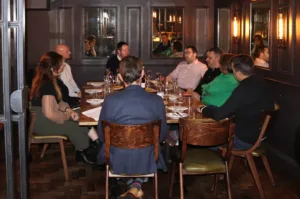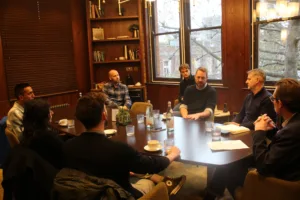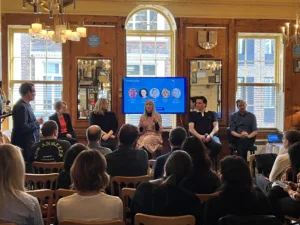Have Google’s repeated delays to the deprecation of third-party cookies had a detrimental effect on the digital marketing industry? Against this backdrop of uncertainty, is the role of digital video changing within the modern marketing mix?
New Digital Age (NDA), in association with Outbrain, recently posed these questions and others to a panel of industry experts at the recent Cannes Lions festival. NDA’s editor Justin Pearse chaired the conversation and was joined by Kai Henniges, CEO & Co- Founder at video intelligence AG (now part of Outbrain), NDA’s partner for the event.
The panel also included: Aurelia Noel, Head Of Innovation and Transformation, dentsu X; Matt Simpson, EVP Chief Digital Operations Officer at Omnicom Media Group; James Florence, Head of Advertising Technology, Immediate Co; Jessica Jacobs, Global Director of Partnerships at Incubeta,, Rhys Williams, Tech and Activation Lead, 7 Stars; Matt Pollington Director, Customer & Marketing at Made.com; and Justin Reid Director of Media, Destinations, Hotels and Growth, Tripadvisor.
Pollington of online furniture retailer Made.com opened the discussion by reinforcing the importance of video marketing to a brand like his own: “We’re moving into what is likely to be quite a challenging time for consumer discretionary spending. My brand invests heavily in video as a storytelling medium as it’s a great way to build salience over time. For sure, brands are focused on short term ROI right now, but we also want those short term measures to provide signals that the long-term picture is moving in the right direction.”
Putting brands in the picture
For many brands, argued Williams of marketing agency 7 Stars , the main barrier to investing more ad spend into video on the Open Web is the complexity of the marketplace and the consternations posed to brand safety.
He said: “Our larger clients are very comfortable with TV and the brand safety that’s built into spending there. We’re definitely seeing a shift in spending towards digital video, but as soon as you move into the fragmented video space, things can get complicated very, very quickly.”
Reid explained that TripAdvisor’s business model means that they lean more heavily on search engine marketing than video marketing, but that within the ‘destination video’ space, the quality of video on offer varies significantly.
“Honestly, there are some really bad travel videos out there and there are some really inspirational videos,” said Reid. “In our business, the quality of production seems to be more important to customers than where you’re delivering it, what format it’s in or what length it is. Obviously, brands always want to see ROI from video, but I think sometimes agencies get hung up on delivering a range of metrics that clients don’t really care about.”
Jessica Jacobs of Incubeta agreed that discussions of long term and short term metrics risked both brands and their agencies losing focus on their primary objective. She said: “Shouldn’t our goal be to win the hearts and minds of consumers? Yes, short-term ROI is good for your immediate goals, but brand building brings equity. We should have more diverse ways of thinking about this. We need to recognise that we’re in the business of storytelling and remember that our goal is connecting a product to a consumer.”
Life without cookies
Aurelia Noel of dentsu X believes that the demise of third-party cookies should represent a renaissance for the digital advertising industry. She said: “The situation has prompted clients to assess their data strategy, to better understand the value of privacy and consent, and become more adventurous as a result. For agencies, that means life has become more complex, but the rewards for getting clients’ video strategy right are significant.
“We recently carried out an analysis of the attention economy, which showed that TV has less attention than digital video. Mobile TV, for example, had 80% Attention compared to about 15% for TV alone.”
Noel also argued that while attention metrics are the big industry talking point right now, a more useful measure to highlight the effectiveness of digital video would be ‘avoidance’, i.e. how many people are making a coffee during a TV ad or buying popcorn during a cinema ad, compared to those being served an ad via a digital channel.
However, Simpson of Omnicom Media group disagreed: “We shouldn’t necessarily bring a whole new measurement metric to play when we’re talking about the same budgets. While you have client organisations set up as they are with procurement departments, with auditing and so on, the system doesn’t favour that change.
“In terms of the loss of third-party cookies, one big positive is that it gets us out of the trap of all chasing the same people and bidding on the same things over and over. I don’t get the sense that anyone is waiting for Google to make its move. Marketers are already exploring a range of ID solutions and contextual solutions, rather than just slavishly observing what the ad server is telling you.”
Relevant information
Publishers, of course, have recognised the value and effectiveness of contextual video advertising for some time. Florence of Immediate Co explained: “When we create a video for publication on, for example, BBCGoodFood.com, the creative itself is going to be really different from one we make for TopGear.com. We know how to engage those different audiences: GoodFood viewers want to know how to do something; TopGear’s audience want something more light-hearted and maybe a bit longer form.”
Kai Henniges of Video Intelligence AG wrapped-up the discussion by posing a question of his own. He said: “The biggest barrier to wider adoption of digital video by advertisers is how do we overcome the issue of fragmentation in the marketplace? Following our acquisition by Outbrain, we’re now working with more than 7500 sites. Our aim is to make it easier – fun even – to buy quality, curated video ad inventory on the Open Web, and help advertisers overcome their hesitancy about buying outside of the walled gardens.”
Part two of this roundtable recap will feature more expert contributions from Freddie Turner, Managing Director, UK MiQ; Deborah Harper, Partner, Mindshare; Benoit Cacheux, Global Chief Digital Officer, Zenith; Shula Sinclair, CSO EMEA & WW, m/SIX & Partners; and Amir S Jan Malik, Digital Marketing Expert, Accenture.









